|
|
|
Sort Order |
|
|
|
Items / Page
|
|
|
|
|
|
|
| Srl | Item |
| 1 |
ID:
128387
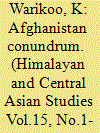

|
|
|
|
|
| Publication |
2011.
|
| Summary/Abstract |
Located at the crossroads of Central, South and West Asia and sharing. its borders with Central Asian Republics of Tajikistan, Uzbekistan and Turkmenistan on the north, Chinese province of Xinjiang in the east, [ran on the west and south west, and Pakistan and Pak-occu pied Kashmir on the south and south east, Afghanistan occupies a unique geo-strategic placement in the region. Distinct ethno-linguistic groups settled in different parts of .»'\fghanistan have diverse social moorings and political affiliations and aspirations. Th us the 'I'ajil
|
|
|
|
|
|
|
|
|
|
|
|
|
|
|
|
| 2 |
ID:
128151
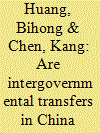

|
|
|
|
|
| Publication |
2012.
|
| Summary/Abstract |
Since 1994, China's central government has implemented a sequence of fiscal recentralization measures to increase its equalization capacity and reduce regional income disparities. However, the effect of intergovernmental transfers on equalization has been called into question by anecdotal evidence that seems to suggest that transfers from the center are not rule-based and are subject to heavy rent-seeking. Unlike past studies, which have focused on the equalization effects of total fiscal transfers from the center, this paper includes an examination of the equalization effects of different types of transfers because some transfers, which are inherently anti-equalizing, may mask the equalization effects of other types of transfers when they are lumped together to find the "average" effect. Using inequality measures, a decomposition of fiscal disparities, and dynamic panel data models, we find that China's intergovernmental transfer system that was established in 1994 does have some equalizing elements. To a large extent, these elements exist due to the mechanism designed to shrink the tax rebates that bear the legacy of the pre-1994 system; to a small extent, these elements exist due to the rule-based general-purpose transfer whose share in total transfers remains small but has increased since 2002. However, the equalization effects of the largest component of transfers, specific-purpose transfers, are anti-equalizing. They are typically not rule-based and thus subject to political influence. As a result, total transfers also exhibit significant anti-equalization effects.
|
|
|
|
|
|
|
|
|
|
|
|
|
|
|
|
| 3 |
ID:
131857
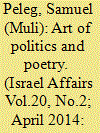

|
|
|
|
|
| Publication |
2014.
|
| Summary/Abstract |
The article demonstrates the potency and volatility of political lyricism by comparing two masters of the trade, the French Jacques Prevert and the Israeli Aryeh Sivan. Although writing in two dissimilar cultures and witnessing disparate political environments, the poetry of Prevert and Sivan is similar in many ways. They are both keen observers of their societies' woes and both are equally critical. Their accounts are s are emphatic and caring and strewn in their passionate, affectionate and brutally honest verses, Prevert and Sivan are the quintessential models for contemporary political poetry. Both poets, despite their disparate cultures and dissimilar local experiences, painstakingly probe and penetrate the political realities around them with velvet nails
|
|
|
|
|
|
|
|
|
|
|
|
|
|
|
|
| 4 |
ID:
128987
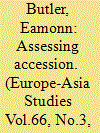

|
|
|
|
|
| Publication |
2014.
|
| Summary/Abstract |
On 1 May 2014, the European Union (EU) celebrated the tenth anniversary of the accession of ten member states-Cyprus, Czech Republic, Estonia, Hungary, Latvia, Lithuania, Malta, Poland, Slovakia and Slovenia. Of these ten new members, eight were Central and East European (CEE) countries that had, for most of the twentieth century, been governed by communist regimes either as republics of the Soviet Union (Latvia, Lithuania and Estonia), satellite states of the Soviet Union (Poland, Hungary, Czech Republic, Slovakia) or as a constituent republic of Yugoslavia (Slovenia). In the subsequent ten years three additional post-communist countries have acceded to the EU (Romania and Bulgaria in 2007 and Croatia in 2013). Commenting on the 2004 EU accession of the first eight former communist countries, the then Irish Prime Minister and President of the European Council, Bertie Ahern, wrote that there was
a particular historical resonance as eight of the former communist countries in the east have emerged from the shadows of the Iron Curtain to join us in working for common goals and for mutual benefit. The artificial divisions, which have blighted our continent's history for so long, are finally being laid to rest.1
|
|
|
|
|
|
|
|
|
|
|
|
|
|
|
|
| 5 |
ID:
130608
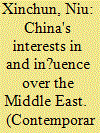

|
|
|
|
|
| Publication |
2014.
|
| Summary/Abstract |
The Middle East became a critical region for China after 1993, when The Beijing became a net oil importer. From this point, it became enmeshed in the complicated regional situation. And so China must realize its basic interests and policy objectives in the Middle East as well as set up an overall, balanced, clear and long-term strategic framework. Policy choices should be made in accordance with such factors as diplomatic tradition, national strength and political ideology
|
|
|
|
|
|
|
|
|
|
|
|
|
|
|
|
| 6 |
ID:
189223
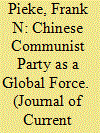

|
|
|
|
|
| Summary/Abstract |
The Chinese Communist Party (CCP) is currently in the throes of redefining itself as not just China's ruling party, but also as the dominant political force of global China. Following the path of Chinese globalisation, this project overlaps with – but is different from – China's much maligned strategy of influencing and interfering in the society and politics of other countries. The principal aim of the CCP's global extension is not to meddle in the affairs of other countries, but tying Chinese people, goods, money, business, and institutions that have ventured abroad back into the strategy and domestic system of China and the CCP. The article shows that China's emerging superpower is informed both by China's unique pattern of globalisation and the CCP's own understanding of the nature, aims, and modalities of its rule, which can only partially be compared to those of earlier superpowers.
|
|
|
|
|
|
|
|
|
|
|
|
|
|
|
|
| 7 |
ID:
131644
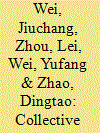

|
|
|
|
|
| Publication |
2014.
|
| Summary/Abstract |
Mass incidents are inevitable in contemporary China and the first thing we should learn is to adopt a correct attitude towards them. Based on the three elements-activity, interaction and sentiment-of collective behaviors in 52 mass incidents in China during 2007-2011, we find that collective behaviors in mass incidents show significant differences in activity, interaction and sentiment. A grade evaluation method is proposed to estimate the evolution of collective behaviors in 52 mass incidents and to classify such behaviors into five grades. Then the influence factors on the three elements are analyzed using multiple linear regression. The regression results demonstrate that the impacts of location, casualties, inner-group relations, group scale and duration on the three elements are very significant. Finally, in the light of the regression results, some implications of collective behavior in mass incidents are proposed for the relevant authorities in responding to mass incidents.
|
|
|
|
|
|
|
|
|
|
|
|
|
|
|
|
| 8 |
ID:
085892
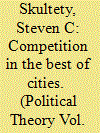

|
|
|
|
|
| Publication |
2009.
|
| Summary/Abstract |
By examining his account of individual virtues, making inferences from his analyses of flawed cities, and teasing out the tacit assumptions behind claims about the nature of political activity, I argue that Aristotle thinks of competition as being a political ideal rather than as an inevitable corruption of civic life. Virtuous citizens compete for civic honor through traditional "competitive outlays" and contend against one another for prestigious offices in the city. Moreover, I argue that the very structure of political deliberation is competitive. It is through a "vis-à-vis" competition among proposals that a winning policy is adopted, and the speakers who offer these proposals are themselves involved in a competition for political influence.
|
|
|
|
|
|
|
|
|
|
|
|
|
|
|
|
| 9 |
ID:
132702
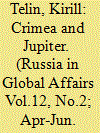

|
|
|
|
|
| Publication |
2014.
|
| Summary/Abstract |
The use of force is no longer legitimate like it was in the 19th and 20th centuries. Conservative-style action from the position of force cannot achieve anything in terms of boosting a country's position even within the traditional zone of influence.
|
|
|
|
|
|
|
|
|
|
|
|
|
|
|
|
| 10 |
ID:
130893
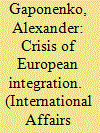

|
|
|
|
|
| Publication |
2014.
|
| Summary/Abstract |
AFTER THE USSR'S COLLAPSE, the Baltic states came under the political influence of the US and the economic influence of the European Union. This influence was used by their new geopolitical "curators" to initiate an anti-Russian line in both the foreign and domestic policies of Latvia, Lithuania and Estonia, as well as to break their economic ties with Russia. At present, the only significant economic ties that Russia still has with the Baltic countries are in the energy sector. It's the supply of natural gas through the pipeline and distribution systems with the use of the Incukalns underground storage facility. It's also the supply of Russian electricity and rail deliveries of hydrocarbons via the Ventspils and Klaipeda ports.
|
|
|
|
|
|
|
|
|
|
|
|
|
|
|
|
| 11 |
ID:
132324


|
|
|
|
|
| Publication |
2014.
|
| Summary/Abstract |
In order to assess the impact of culture on state behavior in international crises, specifically with regard to mediation and its outcome, this study tests hypotheses rooted in both the international relations and the cross-cultural psychology literatures, implementing analysis at both the international-system level and the domestic-state-actor level. At the international system level, the study finds that cultural difference between adversaries affects whether or not mediation occurs during an international crisis but has no effect on tension reduction. At the domestic state actor level, we find that there are certain facets of cultural identity that make a state more or less open to requesting or accepting third-party mediation during an international crisis, but that these facets have no effect on tension reduction.
|
|
|
|
|
|
|
|
|
|
|
|
|
|
|
|
| 12 |
ID:
161993
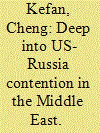

|
|
|
| 13 |
ID:
130928
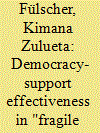

|
|
|
|
|
| Publication |
2014.
|
| Summary/Abstract |
Processes of political transformation and external assistance in fragile states have received increasing attention in the academic literature over the past decade. This literature, however, has not yet adopted a multi-dimensional categorization of fragility. This article discusses the evolution of the concept of fragility, and assesses the growing literature on processes of political transformation in fragile states, with a special focus on the quantitative literature and on the effectiveness of external democracy-support policies. Its novelty lies in its contribution to drawing links between these parallel bodies of literature. Furthermore, this article argues that, by incorporating a more complex definition of fragility, future research could reach more nuanced approaches on how fragility influences both processes of democratization and the effectiveness of democracy-support policies.
|
|
|
|
|
|
|
|
|
|
|
|
|
|
|
|
| 14 |
ID:
133644
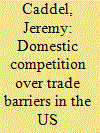

|
|
|
|
|
| Publication |
2014.
|
| Summary/Abstract |
As governments lower traditional tariffs, they may use non-tariff barriers, such as antidumping (AD) and countervailing duty (CVD) laws, to protect domestic industries. Research on the US International Trade Commission (ITC), an independent agency responsible for adjudicating AD/CVD claims, finds mixed evidence of political influence in these cases. However, this research focuses predominately on the political influence of the petitioning industry. Applying theories of bureaucratic oversight, I posit that the ITC must be receptive both to petitioners and to firms that oppose trade barriers. Using an original data set compiled from ITC records of witness testimony in these cases, I demonstrate that domestic opposition to an AD/CVD petition has a significant effect on ITC decisions. Moreover, members of Congress actively intervene on both sides of AD/CVD petitions and have some influence on ITC decisions. These results suggest that AD/CVD politics in the United States is better understood as a contest between competing domestic interests than a captured bureaucracy providing rents to protectionist interests.
|
|
|
|
|
|
|
|
|
|
|
|
|
|
|
|
| 15 |
ID:
130999


|
|
|
|
|
| Publication |
2014.
|
| Summary/Abstract |
We examine the degree to which national political setting, namely domestic political opportunity structures, influences the transnational activities of women's groups in the United Kingdom, France, and Germany. The literature suggests that social groups are more likely to choose international activity when national institutions provide fewer opportunities for domestic activity (Keck and Sikkink 1998; della Porta and Tarrow 2005). Using data about women's groups' activity from a content analysis of news wires from 1980 to 2008, we conclude that women's groups act in the domestic sphere significantly more than they act in the international arena-even when acting on transnational issues-and that groups choose international action when domestic opportunities are less hospitable to group action. Thus, we argue that the domestic sphere continues to be a major influence on social movement activity even as globalization and transnationalism increase.
|
|
|
|
|
|
|
|
|
|
|
|
|
|
|
|
| 16 |
ID:
130903
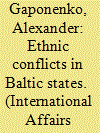

|
|
|
|
|
| Publication |
2014.
|
| Summary/Abstract |
To my mind, the European Union - EU was planned as strictly an economic union and its founder did not plan right from the start to form a single European community of nations or even a European civilization of a higher level.
|
|
|
|
|
|
|
|
|
|
|
|
|
|
|
|
| 17 |
ID:
131008
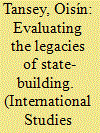

|
|
|
|
|
| Publication |
2014.
|
| Summary/Abstract |
What impact do international state-building missions have on the domestic politics of states they seek to build, and how can we measure this impact with confidence? This article seeks to address these questions and challenge some existing approaches that often appear to assume that state-builders leave lasting legacies rather than demonstrating such influence with the use of carefully chosen empirical evidence. Too often, domestic conditions that follow in the wake of international state-building are assumed to follow as a result of international intervention, usually due to insufficient attention to the causal processes that link international actions to domestic outcomes. The article calls for greater appreciation of the methodological challenges to establishing causal inferences regarding the legacies of state-building and identifies three qualitative methodological strategies-process tracing, counterfactual analysis, and the use of control cases-that can be used to improve confidence in causal claims about state-building legacies. The article concludes with a case study of international state-building in East Timor, highlighting several flaws of existing evaluations of the United Nations' role in East Timor and identifying the critical role that domestic actors play even in the context of authoritative international intervention.
|
|
|
|
|
|
|
|
|
|
|
|
|
|
|
|
| 18 |
ID:
177800
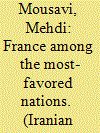

|
|
|
|
|
| Summary/Abstract |
Iran's subjection to Russo-British influence has received the bulk of attention of modern scholarship dealing with the country's interaction with the outside world in the nineteenth century. This article, while not denying the central role played by these two powers in Iran’s domestic affairs at the time, draws attention to a third power with long-standing claims to influence in the country by way of trade policies—France. From the fall of Napoleon in 1815 until the French Revolution of 1848, the French monarchy was especially keen to encourage commerce with Iran, less as a source of increased wealth than to restore and expand French prestige and political influence. This strategy became more significant, when the British and Russian superpowers opposed an active French presence in Iran and prevented France from asserting influence in the country. To contain those powers, France pursued its plan of reaching a trade treaty with Iran as a means of obtaining commercial concessions and privileges as well as to secure its permanent presence in the country. France also aimed to connect Iran to its network of regional trade extending from the Mediterranean to the Indian Ocean.
|
|
|
|
|
|
|
|
|
|
|
|
|
|
|
|
| 19 |
ID:
156020
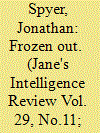

|
|
|
| 20 |
ID:
137540
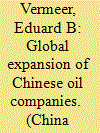

|
|
|
|
|
| Summary/Abstract |
PetroChina, Sinopec, and China National Offshore Oil Corporation (CNOOC) have been prominent instruments used by the Chinese government in its policies to ensure greater security of oil and gas supply in the face of growing domestic shortages. Chinese overseas acquisitions and activities have diversified, with a greater emphasis on offshore, gas and the Americas. Both parent and listed daughter companies are run by CCP-appointed managers who have to balance political and commercial goals. Their lacklustre financial performance can be attributed to domestic and institutional constraints, such as state-set social goals, low pricing, and government controls over their monopolies. Not only have state companies sustained losses from refining activities, but financing their rapid expansion has also increased their debts and dependency on the government. Cases of corruption have further weakened their political influence. Long-term supply contracts have made a greater contribution to the security of energy supply as compared with equity oil and gas. Nationalistic preferences for investment over trade increase company risks but are somewhat mitigated by an integral economic package approach and political backing in weak countries. Recent policies to reduce monopoly power are unlikely to produce viable commercial alternatives, but may increase the focus on listed daughter companies, overseas assets and international trading. Because of these developments and the recent fall in oil prices, a better evaluation of political and economic risks is required.
|
|
|
|
|
|
|
|
|
|
|
|
|
|
|
|
|
|
|
|
|